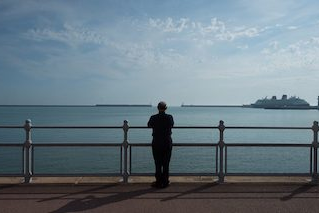JRS protests as 'anti-human' Illegal Migration Bill becomes law

Image: People Not Walls
Source: Jesuit Refugee Services
The Illegal Migration Bill is set to become law after the government won a final series of votes in the House of Lords. In a late-night debate, peers rejected attempts to reinsert time limits on child detention and modern slavery protections. The bill will now go for royal assent and become law.
The Jesuit Refugee Service said in a statement: "The passing of the so-called Illegal Migration Bill by parliament is outrageous.
"This Bill represents a ban on claiming asylum. It contravenes the Refugee Convention and is wantonly cruel. It will mean men, women, and children are incarcerated on a massive scale. It will leave hundreds and thousands in limbo for years on end. It will strip modern slavery survivors of protections and empower traffickers. And it has been forced through parliament at breakneck speed, avoiding scrutiny wherever possible.
"This Bill is anti-refugee, it is anti-human.
"At its passage, we are angry, and we are sorrowful. And we have not given up. We will continue to stand in solidarity with refugees as our government attacks them. The Illegal Migration Bill must be overturned."
Sarah Teather, JRS UK's Director, said: "The Illegal Migration Bill drags any sense of the UK's moral leadership on the world stage headlong into a gutter of hate. In it, we have abandoned the principle of refugee protection, and denied that we have a duty to anyone else in the world. We haven't even done this to achieve any useful end, but revelled in sheer performative cruelty.
"I am particularly horrified that Parliament has decided to revert to wholesale incarceration of children in the immigration system, a practice I was instrumental in outlawing when in Government.
"At JRS UK, we shall continue to oppose this despicable piece of legislation and call on politicians from all parties to overturn it at the earliest opportunity."
When the Bill was first proposed, the United Nations High Commissioner for Refugees (UNHCR) said it amounted to an effective "asylum ban" - which would prevent people fleeing war and persecution from seeking refuge.
"The effect of the bill would be to deny protection to many asylum seekers in need of safety and protection, and even deny them the opportunity to put forward their case."
This is because under the bill a legal duty would be imposed on the Home Secretary to remove "as soon as reasonably practicable" anyone who arrives on a small boat - and to do so without hearing their asylum claim. The so-called "duty to remove" would take legal precedence over an individual's right to claim asylum.
The UNHCR argued this would be "a clear breach of the Refugee Convention" and "would undermine a long-standing, humanitarian tradition of which the British people are rightly proud."
UN High Commissioner for Human Rights Volker Türk warned: "In addition to raising very serious legal concerns from the international perspective, this Bill sets a worrying precedent for dismantling asylum-related obligations that other countries, including in Europe, may be tempted to follow, with a potentially adverse effect on the international refugee and human rights protection system as a whole."


















